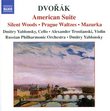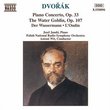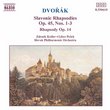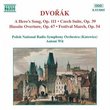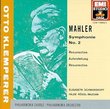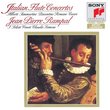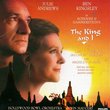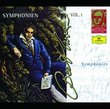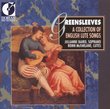| All Artists: Antonin Dvorak, Stephen Gunzenhauser, Polish Radio Orchestra & Chorus Katowice, Polish Radio and Television National Symphony Orchestra Title: Dvorák: Symphonic Poems Members Wishing: 0 Total Copies: 0 Label: Naxos Release Date: 2/15/1994 Genre: Classical Styles: Forms & Genres, Theatrical, Incidental & Program Music Number of Discs: 1 SwapaCD Credits: 1 UPC: 730099559829 |
Search - Antonin Dvorak, Stephen Gunzenhauser, Polish Radio Orchestra & Chorus Katowice :: Dvorák: Symphonic Poems
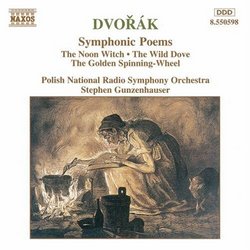 | Antonin Dvorak, Stephen Gunzenhauser, Polish Radio Orchestra & Chorus Katowice Dvorák: Symphonic Poems Genre: Classical
|
Larger Image |
CD DetailsSimilar CDsSimilarly Requested CDs |
CD ReviewsLate Masterpieces Joshua Grasso | Oxford, OH USA | 06/11/2000 (5 out of 5 stars) "I've heard numerous versions of Dvorak's symphonic poems, but this one, the cheapest, is always the one that stands out. I have a deep affection for these late masterpieces, as you can sense Dvorak's delight in depicting the dark, fantastic world of Czech folklore. From the broad sweep of "The Golden Spinning Wheel," to the palpable horror of "The Noon Witch," all three pieces beautifully exploit the late Romantic orchestra and are unmistakably--but not typically--Dvorak. If you only know Dvorak from his last three symphonies, and the cello concerto, give these a try...it's an exciting new look at an all too familiar composer. This version, played with gusto by the brilliant Polish National Symphony, is simply the best. You have to give Naxos credit for going beyond the tried and true and unearthing some real gems. If you're looking to add these brilliant works to your collection, I would highly recommend this version (it's much cheaper than Jarvi's!) 5 stars." Slightly disappointing playing of wonderful music G.D. | Norway | 03/24/2009 (3 out of 5 stars) "There is something really special about late Dvorak. "Late Dvorak" usually means Dvorak after his return from the States and doesn't encompass many works (the symphonic poems, the last two string quartets, Rusalka (and two other operas), the Cello concerto, the Stabat Mater, and a few others); and they are all in an even more personal style than his earlier works - the influence of Brahms can still be discerned, of course, but this is music that really doesn't sound like anything else.
The five symphonic poems, of which three are given here, are masterpieces, and I urge anyone not familiar with them to make the acquaintance. Unfortunately, this isn't really the place to go to. The playing is uninvolved, without sheen or polish and most of all unexciting. Gunzenhauser's approach to the Noon Witch makes this potentially glittering and electrifying work sound turgid and uninspired. The other two works fare slightly better, but the Golden Spinning Wheel lacks poetry and there is little trace of the yearning, fantastical fairy-tale magic about it. The Wild Dove gets what is probably the best performance on the disc; here Gunzenhauser seems genuinely able to shape the music into the appropriate climaxes and dark lyricism. Yet in none of the works does he really challenge the higher-priced competition. Sound quality is undetailed and a little reverberant, but not really bad. But even with the price advantage - and does this disc really have such an advantage any more, even? - it would really be false value to go for this release rather than, say, Kubelik or Järvi." |

 Track Listings (3) - Disc #1
Track Listings (3) - Disc #1